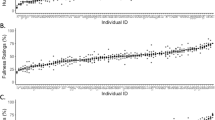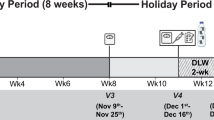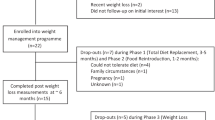Abstract
Objective:
Research shows that slower habituation of salivary responses to food stimuli is related to greater energy intake and that obese (Ob) individuals habituate slower than those of normal weight (NW). No study has examined habituation rates in weight loss maintainers (WLMs) who have reduced from obese to normal weight, relative to those who are Ob or NW.
Design:
Salivation to two baseline water trials and 10 lemon-flavored lollipop trials were studied in 14 WLMs, 15 Ob and 18 NW individuals comparable in age, gender and ethnicity. Linear mixed models were used to compare WLMs with Ob and NW groups.
Results:
Salivation in the WLM and NW groups decreased significantly (for both P <0.005) across trials, indicative of habituation. Salivary responses in the Ob group did not habituate (P=0.46). When compared with Ob group, WLMs showed a quicker reduction in salivation (P<0.05). WLM and NW groups did not differ in habituation rate (P=0.49).
Conclusions:
WLMs have habituation rates that are comparable to NW individuals without previous history of obesity, and show quicker habituation than those who are currently obese. These results suggest that physiological responses to food may ‘normalize’ with successful weight loss maintenance.
This is a preview of subscription content, access via your institution
Access options
Subscribe to this journal
Receive 12 print issues and online access
$259.00 per year
only $21.58 per issue
Buy this article
- Purchase on Springer Link
- Instant access to full article PDF
Prices may be subject to local taxes which are calculated during checkout

Similar content being viewed by others
References
Woods SC, D'Allesio DA . Central control of body weight and appetite. J Clin Endocrinol Metab 2008; 93 (11 Suppl 1): S37–S50.
Cummings ED, Overduin J . Gastrointestinal regulation of food intake. J Clin Invest 2007; 117: 13–23.
Blundell JE, Lawton CL, Cotton JR, Macdiarmid JI . Control of human appetite: implications for the intake of dietary fat. Annu Rev Nutr 1996; 16: 285–319.
Raynor HA, Epstein LH . Dietary variety, energy regulation, and obesity. Psychol Bull 2001; 127: 325–341.
Epstein LH, Temple JL, Roemmich JN, Bouton ME . Habituation as a determinant of food intake. Psychol Rev 2009; 116: 384–407.
Wisniewski L, Epstein LH, Caggiula AR . Effect of food change on consumption, hedonics and salivation. Physiol Behav 1992; 52: 21–26.
Esptein LH, Rodefer JS, Wisniewski J, Caggiula AR . Habituation and dishabituation of human salivary response. Physiol Behav 1992; 51: 945–950.
Epstein LH, Caggiula AR, Rodefer JS, Wisniewski L, Mitchell SL . The effects of calories and taste on habituation of the human salivary response. Addict Behav 1993; 18: 179–185.
Myers MD, Epstein LH . The effect of dietary fat on salivary habituation and satiation. Physiol Behav 1997; 62: 155–161.
Epstein LH, Paluch R, Coleman KJ . Differences in salivation to repeated food cues in obese and nonobese women. Psychosom Med 1996; 58: 160–164.
Bond DS, Raynor HA, Vithiananthan S, Sax HC, Pohl D, Roye GD et al. Differences in salivary habituation to a taste stimulus in bariatric surgery candidates and normal-weight controls. Obes Surg 2009; 19: 873–878.
Phelan S, Roberts M, Lang W, Wing RR . Empirical evaluation of physical activity recommendations for weight control in women. Med Sci Sports Exerc 2007; 39: 1832–1836.
Phelan S, Wing RR, Raynor HA, Dibello J, Nedeau K, Peng W . Holiday weight management by successful weight losers and normal weight individuals. J Consult Clin Psychol 2008; 76: 442–448.
Peck RE . The SHP test—an aid in the detection and measurement of depression. Arch Gen Psychiatr 1959; 1: 35–40.
Schwartz MW, Woods SC, Seeley RJ, Barsh GS, Baskin DG, Leibel RL . Is the energy homeostasis system inherently biased toward weight gain? Diabetes 2003; 52: 232–238.
Rosenbaum M, Goldsmith R, Bloomfield D, Magnano A, Weimer L, Heymsfield S et al. Low-dose leptin reverses skeletal muscle, autonomic, and neuroendocrine adaptations to maintenance of reduced weight. J Clin Invest 2005; 15: 3579–3586.
Rosenbaum M, Hirsch J, Gallagher DA, Leibel RL . Long-term persistence of adaptive thermogenesis in subjects who have maintained a reduced body weight. Am J Clin Nutr 2008; 88: 906–912.
Bartoshuk LM, Duffy VB, Hayes JE, Moskowitz HR, Snyder DJ . Psychophysics of sweet and fat perception in obesity: problems, solutions and new perspectives. Philos Trans R Soc Lond B Biol Sci 2006; 361: 1137–1148.
Acknowledgements
This research was supported by the National Institutes of Health Grant DK066787-02S2. Dr Bond is supported by National Institutes of Health Grant DK083438-01.
Author information
Authors and Affiliations
Corresponding author
Rights and permissions
About this article
Cite this article
Bond, D., Raynor, H., McCaffery, J. et al. Salivary habituation to food stimuli in successful weight loss maintainers, obese and normal-weight adults. Int J Obes 34, 593–596 (2010). https://doi.org/10.1038/ijo.2009.267
Received:
Revised:
Accepted:
Published:
Issue Date:
DOI: https://doi.org/10.1038/ijo.2009.267
Keywords
This article is cited by
-
Understanding the Relationship Between Food Variety, Food Intake, and Energy Balance
Current Obesity Reports (2018)
-
Brain Response to Food Stimulation in Obese, Normal Weight, and Successful Weight Loss Maintainers
Obesity (2012)



